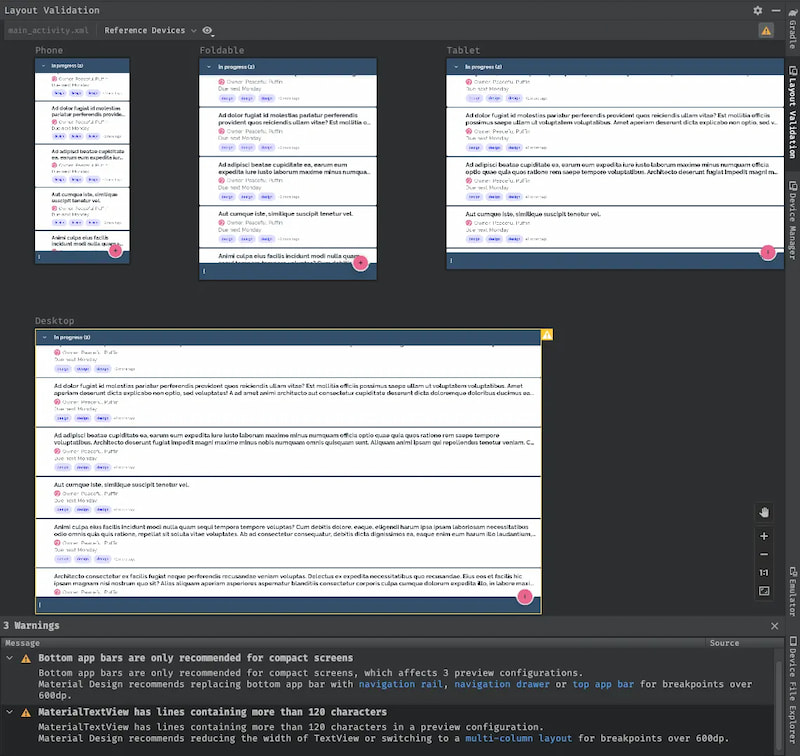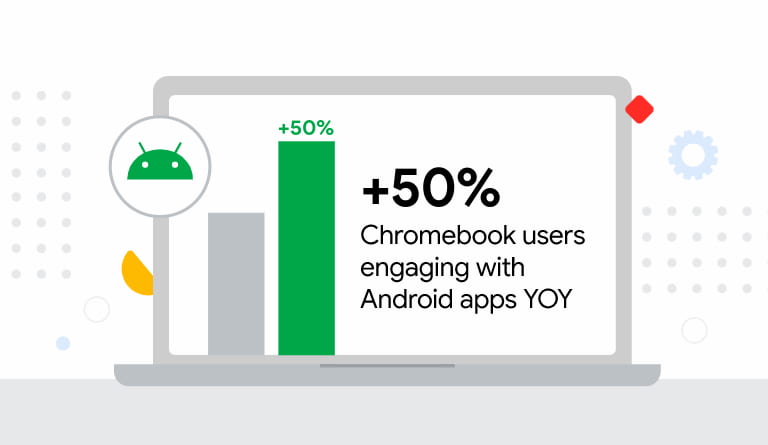We all know the Android app experience on large screen devices isn’t ideal. So too does Google. And that’s the likely reason it’s sharing some data and highlighting helpful tools for developers to adjust Android apps on Chromebooks.
The data is interesting, given that the Android app experience is hit or miss, based on the title.
App engagement on Chromebooks is up 50%
Here’s what Google says:
Whether they’re unleashing their creativity on Concepts, playing games like Crypt of the NecroDancer, or taking notes on Squid, more people are craving their favorite smartphone experiences on large-screen devices, such as Chromebooks, tablets, and foldables. On Chromebooks alone, the number of users engaging with Android apps increased 50% year over year (YOY).
The figures come from Google’s internal metrics, so we can’t verify the claim. But I have no reason to doubt the numbers. When I worked at Google, I know such proclamations were based on actual figures, even if those were internal only.
I have to say, I’m a bit surprised though. Even though Google Play is pre-installed by default on a Chromebook, I would have pegged the data at a lower number. Especially with education being such a large market for Chromebooks, where Android apps can be disabled through device management.
For many, Android apps are a very secondary experience, not the primary reason people buy a Chrome OS device. Then again, this metric measures “users engaging with Android apps”. That means it counts whether someone uses Android software every day on their Chromebook, or just once.
Still, it’s promising for Chromebooks as a whole and particularly for makers of Android apps. While Google itself can’t address every Android app experience on a Chromebook, it can provide help.
Some of that help is also highlighted in Google’s blog post.
Android 11 does some of the heavy lifting
The Android 11 update for Chromebooks is part of that story as developers will have new APIs to use for their Android apps. It also brings improved support for application resizing, which is very welcome. And there’s something that Google did for developers with no code changes required from them:
Android 11-enabled Chromebooks on Chrome OS 93 or higher now automatically run made-for-mobile apps in a window locked to phone or tablet orientations. Depending on which layout they prefer, users can disable the window management feature by clicking the “Resizable” option. Best of all, these updates are available by default across most apps in the Play Store without any developer intervention.
Anytime the app experience can be improved — even a little — with no code changes, that’s a win.
Android Studio changes for Android apps on Chromebooks
Of course, to fully optimize an Android app for the larger screens of Chromebooks, some work on the developer’s part is required. To make this simpler, Google has steadily been adding functionality in Android Studio to assist.
The latest version has a resizable emulator as well as a Layout Validation tool. The latter shows developers what their app looks like on displays with various screen sizes and aspect ratios.

There’s still work to be done but this is promising
Clearly, a few new tools and incentives for more users to boost app engagement alone won’t address the Android app experience on Chromebooks. But this is a good start. Or maybe I should say another good start since this story surfaces every year or two.
Remember that Android apps arrived on Chromebooks way back in 2015. I know because I wrote the official Google announcement in my role. And all new Chromebooks since 2019 come with Android app support pre-installed. So this has been a long road.
Between Android 12L, which has features specific to different (and multiple) screens, and Google’s latest tools, perhaps the end of the road is near?



6 Comments
‘I have to say, I’m a bit surprised though. Even though Google Play is pre-installed by default on a Chromebook, I would have pegged the data at a lower number. Especially with education being such a large market for Chromebooks, where Android apps can be disabled through device management.”
I just did a quick check on Chromebook shipments (the best numbers that I could find):
2014: 5.9 million
2015: 6.8 million
2016: 9.4 million (the first with Google Play)
2017: 10.9 million
2018: 11.9 million (the first with Crostini Linux)
2019: 17 million
2020: 29.6 million
Now you see that there were two huge jumps when Google Play and Crostini were added. It is fair to propose that the former was due to consumer users wanting Android and the latter due to developers, IT workers and other pros wanting Linux. Similarly, while lots of schools bought Chromebooks for their students in 2020, tons of parents bought Chromebooks for their kids during that time also. So even if they were primarily for education, Fortnite and Disney+ were secondary. Also, the best-selling Chromebook by a mile in 2020 was the Lenovo Duet 3. It was primarily a “cheap Android tablet that will actually get updates” for consumers with absolutely no schools buying them and (thankfully) few parents buying them for their kids as the screen was too small and the keyboard attachment too flimsy (and small).
So we have evidence that people started buying Chromebooks to use as Android devices in 2016-2017, evidence that parents bought their kids Chromebooks during the pandemic that weren’t school managed to disable Google Play, as well as evidence that Lenovo Duet (and copycat devices like the Asus CM3 and HP X2 11) that aren’t suitable for education sold in some measure in 2020-2021. Add it up and there is no reason to doubt the increase in Android app usage. Just as there will be no reason to doubt the increase in Linux usage should Google FINALLY release Steam Borealis in 2022.
Good data and good points! I think many Chromebook buyers like the idea of having Android app support to offset any deficiencies of web apps. But I never have (and still don’t) recommend folks buy a Chrome OS device if their primary purpose is to run Android apps. I may change that mindset if the experience improves, of course. And I hope it does!
“I think many Chromebook buyers like the idea of having Android app support to offset any deficiencies of web apps. But I never have (and still don’t) recommend folks buy a Chrome OS device if their primary purpose is to run Android apps.”
The only devices that provide truly good experiences running Android apps are midrange and flagship phones. Chromebooks mitigate the very real shortcomings with Android tablets with a combination of web and Linux apps, x86-64 processors and 7 years of updates.
Don’t forget that Chromebooks grew over 90 % over the same period. So the way I read it, half of new users doesn’t use Android.
Party pooper! 😉
Yep, I’m a (Google) Glass half empty guy. 🙂